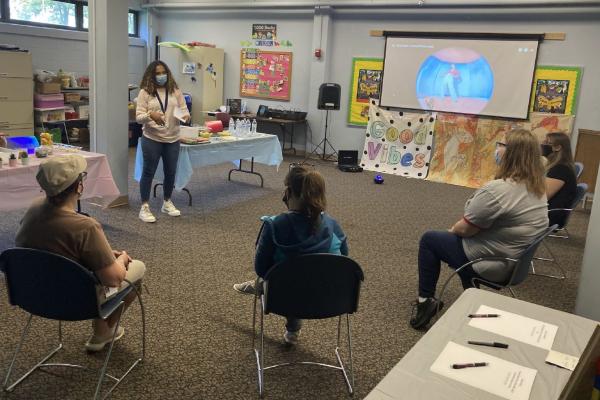“I was quite cynical about young people,” says Joy Robinson, senior adult services librarian at Piscataway Public Library in New Jersey. “But I was totally proven wrong. Interns bring a readiness to tackle the issues of the day — they gave me a sense of relief for the future of libraries and society.”

Maybe you, like Robinson, aren’t quite sold on the idea of library interns. They’re young, often green behind the ears, and they might not feel like a good fit for your library. Or maybe you already know how cool young people are but don’t know where to find them in your community.
Where to start? I spoke with ten library professionals who have supervised high school interns through the Public Library Association’s Inclusive Internship Initiative. They shared their top tips for getting interns, what they’ve learned from working with young people, and why a library internship program benefits everyone involved.
A library intern is not a busywork machine
A consensus among the people I interviewed is that libraries should not treat their interns like volunteers or someone to hand tedious busywork to. Internships are different from volunteer opportunities; they provide a more holistic and intense experience of the library.
“Internships go into the ethics and philosophy behind what a library is,” says librarian Analiza Perez-Gomez of Laredo Public Library in Texas. “Libraries have tons of incredible volunteers, but they are typically not given opportunities to do a deep dive.”
Your intern should experience professional development prospects that cannot be found in volunteer positions. For some libraries, that can mean having interns sit in on meetings or even bringing them along to library conferences. “We had sessions with our interns that taught some of the philosophies of librarianship, like privacy and intellectual freedom,” says Laurel Dooley, teen services manager at Skokie Public Library in Illinois. “These are the classic, core principals of librarianship that might not be top of mind, but our interns found them interesting.”
Don’t, however, pressure your interns to attend every meeting. “Think strategically about what meetings you connect interns to. For example, we had an intern that was a big reader, so we connected her to a summer reading committee meeting,” says Dooley. “And if you do invite interns to meetings, have a quick check-in before and give them a run-down on the meeting topic, who will be there, and if they should be listening for certain things.”
Prepare yourself to be a dedicated mentor to your intern. “The mentorship component is key,” says Nellie Barrett, program officer at the Public Library Association. “By assigning a staff person to be the dedicated mentor—which comes across differently than ‘boss’—teens can feel supported at work in a more individualized way. This is essential if our goal is to foster workplace environments that are inclusive of folks who have historically been excluded from librarianship.”
An internship will be an all-intensive look into what a library does. For a local high school student who lives in the community your library serves, this will be an eye-opening experience. Make sure they are working on programs that interact with the community rather than sitting behind a desk with no public interaction.
“High school interns might come in and assume that they’ll sit around and read all day, but by the time they leave us, they know about everything a library does,” says Jennifer Brenner, library director of Cumberland County Library in New Jersey. “We had an intern who, after her time with us at the library, realized that being a librarian was actually the perfect career fit for her. She would not have known that had she not spent time here and saw firsthand what we do.”
“I always treat my teen interns as a staff position,” says Isaiah West, teen services specialist at Prince George’s County Memorial Library System. “They get trained on every aspect of their job, so if programming is part of it, I give them the same training I would give a new program staff member.”
If an intern is given busywork all day, this can turn them away from the library field as a career option. It can also give them a negative outlook on professional development opportunities as lackluster and meaningless.

Match interns to their passions and give them autonomy
Your interns will come in with many different passions. Some interns might not even be interested in a library career, but that doesn’t mean the internship won’t help them discover a new path. “The beauty of a library internship is that this experience will remain with the intern for a lifetime,” says Jené Brown, director of the Emerging Technologies and Collections Division and racial equity officer at Los Angeles Public Library. “They can apply the skills learned or sharpen them in other aspects of their personal and professional lives.”
Encourage interns to use their passions when planning programs. “Build internships around the intern’s interests so the experience can nurture their passions,” says Rob Franklin, media projects “Bubblerarian” at the Madison Public Library in Wisconsin. “Whether they are extroverted or on the shy-side — it’s important to get a vibe from each intern before they jump into projects.”
“Sometimes sharing passions can be a vulnerable choice, but ultimately can lead to professional and personal growth,” says Tiffany Harkleroad, youth services librarian at Butler Area Public Library in Pennsylvania. “One of our previous interns planned a body image workshop. If she hadn’t been vulnerable, she would not have found the passion for this project that helped our young community members.”
If possible, give your intern a budget and let them plan a program from scratch. “We had a budget from a NASA-funded grant, and we gave one of our interns a chance to plan a program on his own. He found a couple of options for a VR headset to buy and some space games and space simulations. He planned the logistics and ran the in-person event himself!” says Perez-Gomez.
Interns will think of creative programs you probably would’ve never even thought of planning. It’s all about trust and supporting your intern in planning a program they are passionate about.
“With PLA’s Inclusive Internship Initiative, we introduced the library world and the professional capabilities for libraries to people that might never have had the opportunity to see a library career as an option for them,” says Brenner. Giving interns the autonomy to plan programs they are passionate about is everything. For example, Brenner had an intern who was on the autism spectrum who used puppets to teach kids how to check out books.
Remember that your interns are still young
If you are working with high school-aged interns, it’s important to remember that they are still young. For many interns, their time at your library might be their first professional work experience. Treat your interns like any other colleague, but keep in mind that they do not have the same experience as everyone else on your team.
“Don’t expect kids to know everything about a library,” says Franklin. “A lot of the stuff they learn, like the Dewey Decimal system, can be a shocker for kids. Really make a point to gauge where each intern is at.”
Working with newbies to the workforce provides a good opportunity to demonstrate healthy habits. “As a mentor, make sure interns are taking their breaks and not working through them,” says Dooley. “Make sure that you are also taking your breaks and modeling a healthy approach to work. Schedule checks-ins to go over how they feel, not just as interns, but as humans.”
Internships are, first and foremost, a learning opportunity. Sometimes, programs fail, and nobody shows up for a program that you planned for months. To a seasoned programming librarian, this is nothing out of the ordinary. However, if this happens to a young intern who planned an event on their own for the first time, it can be heartbreaking.
“Don’t let low attendance discourage your intern. Teach them that the work itself is the reward,” says Robinson. “Planning is the good, fun stuff. The icing on the cake is when you can share it with the community.”
Recruit locally
“Interns are the community,” says Rachael Bild, teen services librarian at Skokie Public Library in Illinois. If you’ve been looking to engage your community, an intern is the perfect way to start. “One of the huge benefits of having local interns is that they are now library ambassadors and are prepared to talk about what the library does and what people can do at the library with their families and friends.”
“The first place you should look for your teens is in-house,” says West. “Do you have coding clubs or a teen volunteer program? These are the places that teens already are engaging with your library, and this would be a great place to pull an intern from.”
“Madison Public Library uses an equity lens to target resources and programming for those with less access or who are underserved,” says Jesse Vieau, teen services librarian at Wisconsin’s Madison Public Library. “The best internships, including the years of our previous Inclusive Internship Initiative interns, were when the teen had come up through longer and targeted Bubbler project series where they had been invested in the production and sharing of personal content.
“Reaching out to local schools also guarantees that you will be recruiting directly from your community. “If you have a goal of recruiting kids that might not be overly represented in the library field, you can reach out to school clubs that center particular cultural groups, like the Black Student Union or the ASL Club” says Bild. “These connections can create long-term relationships with those clubs and teachers. It can keep the cycle going for the interns you recruit.”
Be prepared to advocate for interns – and pay them
Unpaid internships are a privilege that many cannot afford. We should be paying interns for their labor and rewarding them for their tremendous insight and assistance.
If you want to start paying your interns, you will probably need to explain the need for a paid internship program to higher-ups, and this can be quite the challenge. Put on your advocacy hat and try your best to explain why the library needs paid interns and not just volunteers.
If you want to approach a higher-up about bringing on local paid interns, have a concrete plan, says Brenner. “Share a detailed recruitment plan that lays out the areas of your community that you will focus on and what schools you will reach out to. You should also have a price ready — people want to see numbers and they want to see breakdowns. They want to know how and why they should spend money on an intern, so come prepared to explain what the community will gain from paying an intern. Finally, work with your board and staff to make sure everyone is on the same page regarding an intern’s expectations, duties and importance.”
If you’re running into roadblocks, consider working with a local organization. “Partner with a local organization that works with teens to help them find summer jobs or internships,” says Perez-Gomez. “Oftentimes, the organization will cover the stipend or pay for the summer.”
You can also turn to local high schools or colleges. “If there is no way to have paid interns through your library,” says Harkleroad, “look to local colleges and high school programs that can provide their own stipends or have students fulfill credits.” Provide the intern with some form of compensation if it cannot be monetary, such as school credits, lunch included, or a public transit card.
Interns are hard work. But in the end, library internships will benefit the intern, the mentor and the community for the long-term. “I’m now embarrassed to admit that I was a young-person cynic!” says Robinson. “But they find solutions in the obscure. You will constantly be impressed and inspired by their ideas.”

